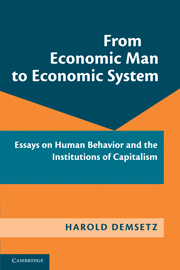INTRODUCTION: ABOUT THESE ESSAYS
Published online by Cambridge University Press: 22 July 2009
Summary
The last two centuries have revealed an upward, but unsteady, trend of capitalism in many portions of the world. And, during the same interval of time, there has beeen an upward trend in the reputation of the discipline of economics. In one sense, these are strongly related, since puzzlement about the economic system that we now call capitalism motivated much of the mainline work done by economists during this interval. However, in another sense, the two happenings are, or have become, unrelated, since much economic theory describes human behavior and production opportunies in ways that are not specific to a type of economic system. Thus, the first law of demand – the negative relationship between the quantity of a good acquired by a person and the cost (or, in capitalism, the price) of acquiring the good – is testably operative in every type of economic system. Similarly, the relationship between the unit cost of producing a good, measured in terms of amount of resources committed to its production, and the total number of units of the good produced is a question of technology, not of economic system.
The main difference between economic systems is in regard to the constraints that are applied to human behavior. The fact is that students of economics learn much about universally applicable propositions and little about the institutions that define applicable constraints.
- Type
- Chapter
- Information
- From Economic Man to Economic SystemEssays on Human Behavior and the Institutions of Capitalism, pp. 1 - 4Publisher: Cambridge University PressPrint publication year: 2008



